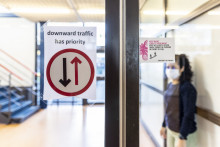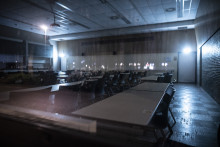A maximum of 75 students may gather in a lecture room and students must wear a face mask ‘everywhere, at all times’, the government decided last Friday. But at least they can come back to campus again.
An exception still applies in the case of interim and final exams: the number of students allowed to attend is not limited to 75.
Resilience
News of the relaxations had already leaked out. Minister of Education, Culture and Science Robbert Dijkgraaf had already said that reopening secondary vocational and higher education was high on his list of priorities.
‘Young people have shown a lot of resilience’, Dijkgraaf says in a press release, ‘but a limit has also now been reached. Despite the large number of infections, we are taking a number of measures to allow face-to-face teaching in a responsible manner.’
The advice is to do a self-test twice a week (self-tests can be ordered via www.zelftestonderwijs.nl or from a student’s educational institution). Students and staff are also advised to wear disposable face masks rather than fabric masks.
Desperately needed
Student organisations are pleased with the reopening. Lisanne de Roos, Chair of the Dutch National Students’ Association, calls reopening education ‘really the only correct decision’. ‘Face-to-face teaching gives students the breathing space they so desperately need - even with a face mask on.’
Ama Boahene, chair of the Dutch Student Union, shares that view. ‘Sitting at home a lot gives rise to concentration problems, loneliness and mental health problems among students’, she says. ‘It’s wonderful news that this is now coming to an end. We must now hold on to that and avoid education having to be closed again.’
Higher education institutions welcome the news as well. ‘We are relieved that our students are able to get ‘live’ education again’, says Maurice Limmen, chair of the Netherlands Association of Universities of Applied Sciences. ‘Face-to-face teaching is very important for the personal development of our students.’
Pieter Duisenberg, chair of Universities of the Netherlands seconds that opinion. But he knows that some students and lecturers will be less happy about it. ‘Given the rising number of infections, we will deal with it in the safest possible manner and we are giving our full attention to the concerns of staff and students’, says Duisenberg.
Hospitality sector
Only the hospitality and culture sectors remain closed, including the clubs of student associations. Many people in the hospitality and culture sectors are upset by the policy. Why should a clothing store or a hairdresser be safer than a restaurant or museum, they wonder.
‘I fully understand that it feels completely unfair’, said Rutte, ‘but the sum of all the contact moments in society determines the risk, so not everything can reopen at the same time.’ People would also need to travel to visit museums, potentially giving rise to extra risks.
The Omicron variant of Covid-19 causes less severe illness but is more infectious, Ernst Kuipers explained. Problems could nevertheless arise if too many people get infected at the same time. But the government is still willing to take a risk by relaxing some of the restrictions.
Movement
We have to move around to stay healthy, moreover two out of three young people feel lonely at the moment, said Kuipers. ‘Keeping everything closed for an even longer period would damage our health too. At the same time, we know that more infections will occur because of these relaxations.’
There has even been the risk of a sort of revolt if the lockdown were to last longer. Shopkeepers in a number of municipalities had announced that they would be opening their doors, lockdown or not. And some mayors had no intention of handing out fines.
‘To me, it does not feel like opposition’, said Rutte. In his view everyone has had enough of the coronavirus measures. ‘I am done with it, Ernst Kuipers is done with it, we are all done with it.’ But he wants to avoid people being turned away from hospitals because there is no more room thanks to the number of coronavirus patients, he said.
Covid pass
The government is still working on expanding the use of the Covid pass, potentially even in higher education. But it will still take some time. Minister Kuipers first wants to know what the effect of the Covid pass is in relation to the highly infectious Omicron variant.






